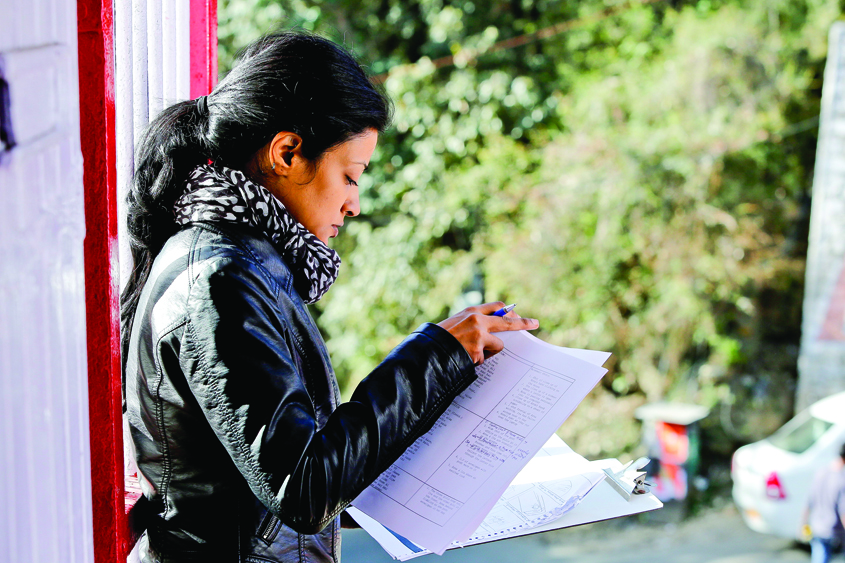Q. You assisted Imtiaz Ali in his films, like Love Aaj Kal, Jab We Met and Rockstar. When did you decide direct your own film?
A. When I was in London, I saw Rang De Basanti and it changed my entire perspective. And I decided that this was what I wanted to do. I came back to India after that and said to myself, let’s try out in the film industry. And then I joined Imtiaz Ali as an assistant director for his films.
Q. How different is assisting someone on a film set from becoming a full-fledged director?
A. When you are assisting someone, it’s very easy because you are just executing and following someone else’s vision. And all you have to do is make sure that it’s done. But the ideas, the actual thoughts and the way the film is conceptualised, none of that is yours. So, you are not really responsible for how the film turns out. But when you are a director of the film, you are responsible for each character — it should have consistency and it should look real. And you make sure of all things that make your film good. It’s the director’s responsibility to get all the performances and the overall look of the film right. The director has to create a vision which an assistant director is a part of, which should be executed well.
Q. You are also the script writer of your first film, Dear Maya. What was the idea behind this film?
A. I read this article somewhere about a woman who had locked up herself for some 20-30 years, and it struck me. And I thought, how could anyone bring her out of the house? That’s the way the idea started.
Q. How much time did you take to complete this film?
A. It took me four months to write the script and one-and-a-half year to complete the film.
Q. Manisha Koirala will be seen in your next film, for the first time after her cancer treatment. Was she always your first choice for this film?
A. Yes. She is a brilliant actor. When I wrote the character, I could not imagine anyone else. And I was very keen to cast her. I have watched all her films while growing up and she is very versatile. She can be very vulnerable and then she can be extremely beautiful, which means she can do everything. That’s the beauty of Manisha.

Q. Which directors do you look up to, in India and internationally?
A. Internationally, I look up to Alejandro González Iñárritu, the director of Birdman and The Revenant, and Sam Mendes. In India, I am a big fan of Rakeysh Omprakash Mehra.
Q. You have been in this industry for a while. How well-placed are women directors here?
A. I don’t have anything good to say about it. The scenario is pretty bleak. Where are good women directors, or women directors in general? And the ones who are there — Zoya Akhtar, Farah Khan, Gauri Shinde — these are all big directors in the mainstream. But there are a lot more as independent filmmakers, but in the mainstream only these three. And all three are somewhere related to a film family. So, that doesn’t give you a very good picture of how things are. Women have a long way to go in this industry.
“I think you should not wait for anything. Just go ahead and make your film. Sometimes, a lot of time is wasted for waiting for big producers, big casts. A lot of young filmmakers end up wasting a lot of time. Including me, I have also done this. Just go and make your dreams come true.”
A. Whether you are a man or a woman, it’s tough here. There are enough men and women trying to make films and everyone is struggling for the same. But as a woman, it takes extra effort to survive in this industry. See, I can’t generalise it but the struggle for an actor is different than a struggle of a technician. When you are an actor, you have different struggles. So, everyone has their own stories.
Q. Also, as a young director, what is your opinion on the kind of films Bollywood is making these days?
A. What’s happening is that the audience is evolving and I feel like maybe producers are evolving a little less than the audience. It’s fair also because producers have to put in money, so obviously they don’t want to invest or take risks with new things. But there’s definitely a change. Because there are some films which are on good topics and that’s great to see. People who are making offbeat films, they will be able to tell you better because making an offbeat film is harder than making a mainstream cinema. And I don’t think the balance will ever change. There will always be a mainstream on the one side, and all the other films on the other side. This is not going to change.
Q. A film that has inspired you a lot?
A. Life is beautiful. The film is really, really beautiful.
Q. What advice would you like to give to youngsters who want to become filmmakers one day?
A. I think you should not wait for anything. Just go ahead and make your film. Sometimes, a lot of time is wasted for waiting for big producers, big casts. A lot of young filmmakers end up wasting a lot of time. Including me, I have also done this. Just go and make your dreams come true.
Q. If you had to describe your next film in one word, what would it be?
A. Positive, or optimistic.

